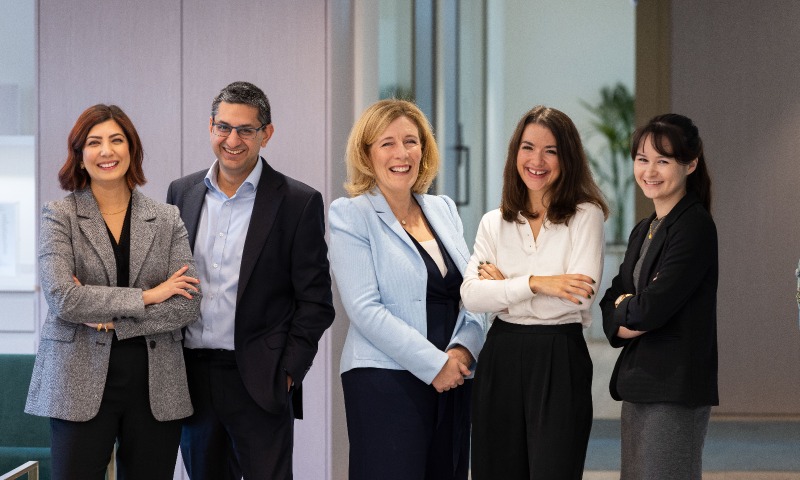Emma Wright is a senior commercial and regulatory lawyer focused on technology, cybersecurity, AI and telecoms. She leads the highly rated Technology, Data and Digital team at Harbottle & Lewis (which she established on her move from Deloitte), where she acts for all manner of small and large suppliers and customers from a variety of tech verticals on their commercial partnerships with the private and public sectors alike and wider business arrangements including the handling of data and regulatory compliance.
Ms. Wright is also Director and Counsel of the Interparliamentary Forum on Emerging Technologies, a not for profico-founded with British MP Darren Jones which has built a global network of legislators focused on sharing and collaborating on the regulation of emerging technology. She sits on the Global Forum of Women 4 Ethical AI – a network of global experts focused on the adoption of ethical AI and is working with UNESCO and legislators in countries from across the world on the implementation of the UNESCO Recommendation on the ethics of artificial intelligence. She is recognised as a ‘Leading Individual’ by legal directories in her field of expertise. She’s listed by Computer Weekly as one of the most influential women in tech and she sits as a Non-Executive Director at tech scale up Playfinder.
Recently, in an exclusive interview with CXO Outlook Magazine, Ms. Wright shared her insights on how AI is reshaping the legal profession, her career trajectory, personal role model, success habits, future plans, and much more. The following excerpts are taken from the interview.
How is AI reshaping the legal profession?
The legal profession is just at the start of its digital transformation journey, and it looks like AI will be an extremely useful tool for lawyers for certain things. I think as a profession we should always be looking how we can improve the service we provide to our clients – the use of AI being a case in point but we also need to be aware of the risks whether relating to client confidentiality or that the AI’s output may be incorrect.
What are your thoughts on diversity and inclusion? How important is it to have authentic conversations with leaders, professionals, and changemakers to create more acceptance across the globe?
I believe diversity of thought will be one of the key ways businesses can solve the most complex problems and the evidence supports this however I believe authentic conversations based on business drivers and constructive challenge are some of the best tools to build this acceptance.
Emma, please tell us about your background path to your current role.
I have always had an interest in technology – I was the only girl in the computing class at school – yet always felt I wanted to be a lawyer – even though I had no frame of reference as to what one was. It was a stint in the UK Government as a policy adviser that made me realize there was a way of combining both of these things and ever since then I have pursued a legal practice focused on technology in its broadest sense.

What is the most exciting and most stressful aspect of your role as the tech, data and digital Partner at Harbottle & Lewis?
I love it when we are instructed on a new matter which is of strategic importance to the client – where the strategy as to how to achieve the client’s objectives is as important if not more so than the legal advice. I equally love it when I am able to watch members of the team grow in confidence and experience. The most stressful aspect of the role for me is handling my working mum’s guilt.
Tell us about your role and responsibilities as the Non-Executive Director at Playfinder.
I bring my experience of the tech sector and commercial partnerships to this role. As Playfinder’s focus is on democratizing access to sports facilities while also opening up a new revenue stream for schools, it is a mission close to my heart. I believe we have to equip everyone with the tools to stay fit and healthy and encourage them to do so.
You are also the Director at the Interparliamentary Forum on Emerging Technologies. Tell us about this non-profit platform and its mission.
IFET has built and continues to build a global network of legislators focused on the regulation of emerging technology, in particular AI. Our mission is for legislators to be able to share best practice and better equip them in this area where the speed of technological advances means often it is a struggle for law and policy to keep up. We have recently signed a Memorandum of Understanding with UNESCO to increase awareness and knowledge of the UNESCO Recommendation on Ethical AI amongst legislators in 40 countries.
Looking back, which women in your life have had the most influence on your career?
My first boss was a woman and took me aside and encouraged me to change career paths – giving me the benefit of her experience. She was incredibly generous with her time and support.
What does the term “authentic leadership” mean to you?
To me it means being open, transparent and consistent with the team about expectations set in order to achieve results yet also genuinely demonstrating empathy.
Could you highlight some of your success habits that enable you to meet your goal?
I still work off paper lists and this allows me to delegate to others – effective delegation is one of my success habits.
Where do you see yourself in 5 years from now?
I hope to continue to lead a thriving and diverse team of tech law experts who continue to be advising an array of clients on both the leading edge and bleeding edge of technological developments.


